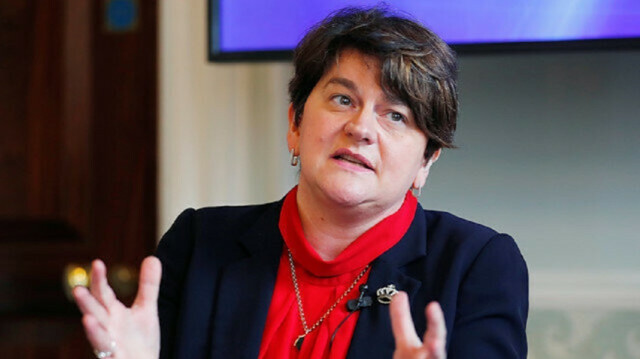
The resignation of Arlene Foster as both Northern Ireland’s first minister and head of the Democratic Unionist Party (DUP) on Wednesday has added more uncertainty to the political atmosphere of the troubled region, which has seen an uptick in violence over the last month.
Foster announced her exit after 27 of her party’s assembly members and eight of its Westminster MPs penned letters calling for her resignation and a leadership contest. Foster will step down as first minister on May 28 and as party head by the end of June.
“It is important to give space over the next few weeks for the Party Officers to make arrangements for the election of a new leader. When elected I will work with the new leader on transition arrangements,” Foster said in a statement.
“As First Minister it is important that I complete work on a number of important issues for Northern Ireland alongside other Executive colleagues. Northern Ireland and its people have been heavily impacted by the Covid-19 pandemic and there remains more work to be done to steer us thorough the pandemic and to lessen its impact on the lives of everyone,” she added.
- Reasons for revolt
The internal party revolt is largely a result of the imposition of a trade barrier in the Irish Sea between the UK and Northern Ireland, which itself is a result of the Northern Ireland Protocol of the 2020 Brexit deal. Unionists fear that such a trade barrier threatens their rights in the region and would allow for a united Ireland.
Grassroots members of the DUP placed the blame on Foster and her allies for allowing the creation of a trade barrier in the Irish Sea. Many, however, argue that the party made Foster a scapegoat in an effort to divert blame and distance itself from its debacle in helping create such a border and prevent voters from defecting to other hardline unionist parties and groups.
The DUP supported Brexit, defeated former Prime Minister Theresa May’s efforts to cushion the impact it would have on the region, and played a major role in paving the way for Boris Johnson to become her successor. Johnson is the chief architect of the Northern Ireland Protocol which allows for frictionless trade between the Republic of Ireland and the north but implements trade tariffs between the rest of the UK.
- Possible leadership contest
Following Foster’s resignation, the DUP will now begin the process of electing a new leader, a first in its 50-year history. According to party rules, a leadership vote should be called by the end of this month and if a contest is to take place, a small number of the party membership – 41 assembly members, MPs and peers – will choose Foster’s successor.
Once Foster steps down as head of the region at the end of June, the DUP would be requested to nominate a successor within a week, followed by a vote in the assembly on whether the replacement is an acceptable candidate. If, however, a replacement is not nominated, the Northern Ireland secretary in London will call an assembly election.
The chief contenders in such a contest would be Sammy Wilson and Ian Paisley, Jr., son of the of the party’s founder Ian Paisley. The two candidates are well known and outspoken unionist MPs with an active and colorful history in the party. They are also Brexiters and feature on the right of the party. Gavin Robinson and Sir Jeffrey Donaldson, also unionist MPs but moderates compared to Wilson and Paisley, are also expected to throw their hats into the ring.
- Impact on Northern Ireland
Foster’s resignation will add to growing uncertainty in a region that has been beset by communal violence in the past month. Rioting and street violence, mainly in unionist areas of Belfast, have reopened the wounds of a troubled past in which Catholic republicans fought street battles against Protestant unionists and the British Armed Forces in an effort to unite with the republic.
This volatile atmosphere is intensified by distrust and suspicion between the unionist DUP and the republican Sinn Fein. The two parties, as part of the Good Friday Agreement that brought peace to the region in 1998, jointly share power in the Northern Ireland executive, but both represent a divided community. Sinn Fein is seeking a referendum on Irish unity and demographic changes in the region that could point to a future united Ireland, a prospect that is unacceptable to the DUP and the wider unionist community.
Intense rioting and community unrest between young Protestant unionists and Catholic republicans erupted in Northern Ireland earlier this month. The violence injured a number of police officers and is the worst in recent years. It has prompted a flurry of diplomatic activity between London, Belfast, and Dublin













